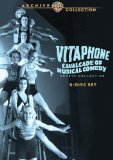| Reviews & Columns |
|
Reviews DVD TV on DVD Blu-ray 4K UHD International DVDs In Theaters Reviews by Studio Video Games Features Collector Series DVDs Easter Egg Database Interviews DVD Talk Radio Feature Articles Columns Anime Talk DVD Savant Horror DVDs The M.O.D. Squad Art House HD Talk Silent DVD
|
DVD Talk Forum |
|
|
| Resources |
|
DVD Price Search Customer Service #'s RCE Info Links |
|
Columns
|
|
|
Vitaphone Cavalcade Of Musical Comedy Shorts
Warner Archive // Unrated // March 29, 2011
List Price: $49.95 [Buy now and save at Wbshop]
The Movies:
I've sung the praises of Warner's direct-to-consumer program, the Warner Archives, many times in the past and I'm going to do it once. They've released an amazing collection of early talking films in the Vitaphone Cavalcade of Comedy Shorts Collection. It's a treasure-filled six-disc set that has a little of everything. From jazz musicians to vaudeville acts to short plays this release has covered all the bases. That would be enough to make me recommend it, but there are also two whole discs of early Technicolor shorts that look absolutely beautiful. It's a must-buy collection that includes hours and hours worth of entertainment.
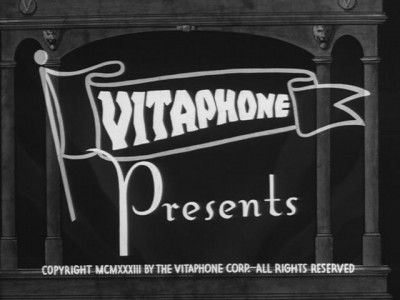
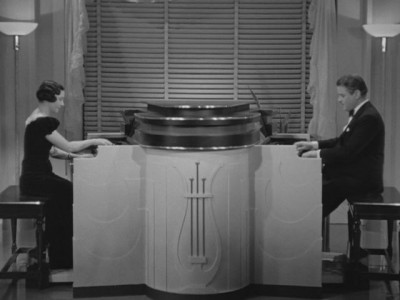
Though the first films were silent, people had been trying to make movies almost since the media's inception. As early as 1895 Thomas Edison marketed the Kinetophone, a machine that would allow a single viewer to watch a short reel of film with music piped into earphones, and though that system ultimately failed, the quest didn't. There were a couple of big obstacles that stood in the way however. The first was amplification, how do you make the sound loud enough for an audience to hear it? (Phonographs at the time were not powered by electricity, you just wound it up and the sound emitted from a horn. It wasn't very loud, but sufficient for a small room.) The other problem was synchronization. How do you get the sound to match what's on the screen and stay in synch?
Western Electric decided to try their hand matching sound to movie pictures and came up with one of the first practical systems. Using the Audion amplification tube and the condenser microphone they solved the volume problem, and by using a single motor to run both the film projector and a phonograph they solved the synching issue. Their new system had its flaws, the oversized 16" records could only be played 20 times before they wore out for one, but it sounded much better than the competing sound-on-film systems. So in 1925 Warner Brothers bought the system, dubbed Vitaphone, and started to experiment with adding synchronized sound to their films.
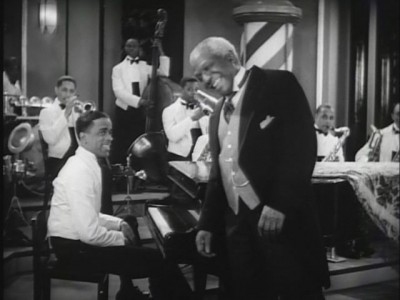
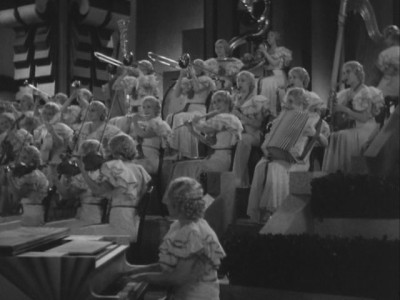
Though the sound-on-disc system would be abandoned within a few years, Vitaphone was part of the Warner Brothers studio for decades and was responsible for their short subject releases. At first they mainly released vaudeville acts and musical numbers. It was easy to get a group or act to come in and record a bit for some quick cash, but Vitaphone shorts started evolving quickly and soon become mini-movies.
The great thing about Vitaphone shorts in general and this collection in particular is that these films are a document of the past. It's one thing to read about a popular vaudeville act like Fritz Herbert and his sister Jean's drunk socialites dance routine but seeing the act is another thing all together. (You can see the Herbert's act in The Sunday Round-Up.)
This set collects a wide variety of Vitaphone shorts, from vaudevillians at the height of their popularity, to big bands, to singers, to dramas and comedies there's something for everyone here. The set starts out with a 1926 recording of vaudeville stars The Howard Brothers doing some of their jokes and singing. It's one of only two films the duo made (the other is
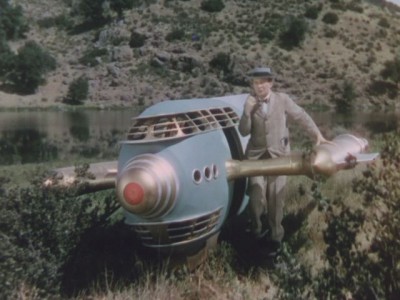
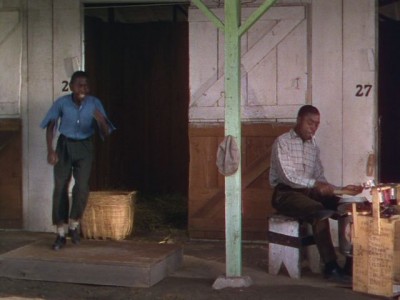
There are a lot of surprising films here, with just about every one offering something special. One of my favorite discoveries was a series of shorts (going by the names Movie Album, Movie Memories, Thrills of Yesteryear, and others) that riff silent movies ala MST3K. Each short was comprised of a series of clips from old films and a narrator would poke fun at the action. Not only were these pretty funny but the narrator also pointed out some of the stars featured in the films, many of them (like comedian John Bunny) forgotten by the time these were made.
Another great series is Vaudeville Reel. These four movies highlighted some A-level vaudeville acts that were very, very good. One of the installments features an excellent trio of tap dancers who went by the name The Three Queens who inspired me to see if they had been in any other films (apparently they were in one more Vitaphone movie). Each short is made to resemble a vaudeville show with an attractive girl holding up a sign with the name of the act (is there a name for those things?) followed by a performance that lasts a couple of minutes. There are all sorts of acts: a guy who eats a lit cigar followed by a violin and then some of his suit, a dog trainer, Chinese acrobats, and even a diminutive song and dance team. As I said, all of the acts have been honed to perfection from years on the vaudeville circuit.
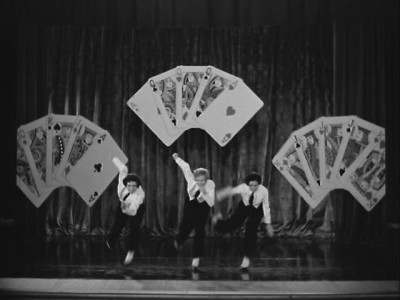
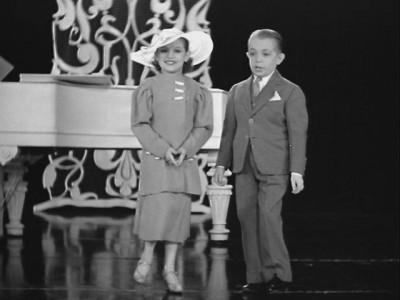
Not all of the films had top talent, but the lesser acts can still be just as entertaining. Nine O'clock Folks (1931) featured another mini-vaudeville show, this one with the framing story of a town hall meeting, but the acts, while polished, didn't feel like they ever played on the big circuit. There was a guy with really long shoes (3-4 feet) who dances and did tricks that his enormous footwear made possible and the show concludes with a "bouncer" who does a comedy act with a trained dog in a tuxedo. Not anything that would impress Ziegfeld, but it's the type of entertainment that's not done anymore, and that makes in very interesting.
Another highlight is the two Technicolor discs. These were a lot of fun and beautiful to watch. They start out with a pair of Leon Errol films, Service with a Smile and Good Morning Eve. The former has him trying to scam his insurance company after his service station burns down by insisting that all the work was done by attractive women in skimpy outfits who sang while they repaired cars. The latter is just as interesting.
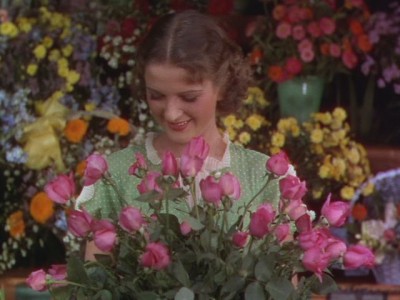
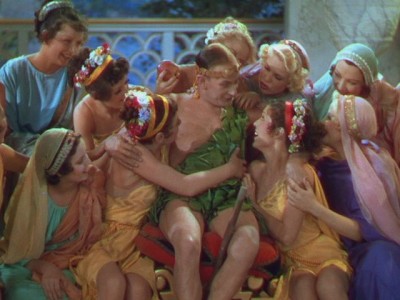
A lot of these were pretty funny too, especially if you like witty word play. In Gypsy Sweetheart a butler is reading the palm of an attractive young gypsy:
Gypsy: Five-foot-two with heels.
Marx brother's fans will recognize the lady of the house in this short, Margaret Dumont.
The shorts in this collection are:
Disc One:
Between the Acts at the Opera (1926)
Favorite Orchestra of the Motion Picture Colony (1928)
Tal Henry and His
Rhythms (1929)
The Opry House (1929)
Red Nichols and His Five Pennies (1929)
23...Skidoo (1930)
Fashion's Mirror (1930)
Henry Santrey and His Soldiers of Fortune Orchestra (1931)
Opening Night (1931)
One Way Out (1931)
Jack Buchanan with the Glee Quartette (1930)
Bubbles (1930) - odd piece with kids dancing and singing
Disc Two:
The Grand Dame (1931)
Nine O'clock Folks (1931)
Hot News Margie (1931)
The Mild West (1933)
Rooftops of
Surprise (1935)
Disc Three:
Thrills of Yesterday: Serious Moments from Serial Days (1931) Movie Album (#1) (1932)
Inklings (1933)
Movie Album (#2) (1932)
Nickelette (1932)
Movie Memories (#1) (1933)
A Penny a Peep (1934)
The Camera Speaks (1934)
Hollywood Newsreel (1934)
Movie Memories (#2) (1934)
A Trip through a Hollywood Studio (1934)
Disc Four:
Harry Warren, America's Foremost Composer (1933)
Barber Shop Blues (1933)
A Big City Fantasy (1934)
Mirrors (1934)
Phil Spitalny & His Musical Queens (1934)
Don Redman & His Orchestra (1934)
Mr. & Mrs. Jesse Crawford at Home (1939)
Vaudeville Reel (#1) (1934)
Vaudeville Reel (#2) (1934)
Vaudeville Reel (#3) (1935)
Vaudeville Reel (#4) (1935)
Disc Five:
Technicolor -
Service with a Smile
Good Morning Eve
What, No Men?
Gypsy Sweetheart
Okay Jose
Carnival Day
Disc Six:
King of the
Changing of the Guard (1936)
The Sunday Round-Up (1936)
Out Where the Stars Begin (1938)
The DVDs:
These 53 (!) shorts arrive on six DVDs housed in a single-width keepcase.
Audio:
The mono audio track sounds very good for films of this age. There's a touch of background noise in some shorts, but nothing distracting. The voices are clear and it's easy to discern what's being said. What more could you want?
Video:
This full frame image is pretty amazing - they all look fantastic. There's some very minor print damage (spots and dirt) here and there, and just one or two have some evidence of film decomposition, but that's it. The contrast is excellent and the level of detail is surprisingly strong. Overall these are some great looking movies.
Extras:
None.
Final Thoughts:
This is an absolutely amazing set. A truly wonderful compilation of some very entertain and historical short subjects. Anyone who enjoys shorts or early cinema should run out and get a copy. DVDTalk Collector's Series.
|
| Popular Reviews |
| Sponsored Links |
|
|
| Sponsored Links |
|
|
| Release List | Reviews | Shop | Newsletter | Forum | DVD Giveaways | Blu-Ray | Advertise |
|
Copyright 2024 DVDTalk.com All Rights Reserved. Legal Info, Privacy Policy, Terms of Use,
Manage Preferences,
Your Privacy Choices | |||||||









